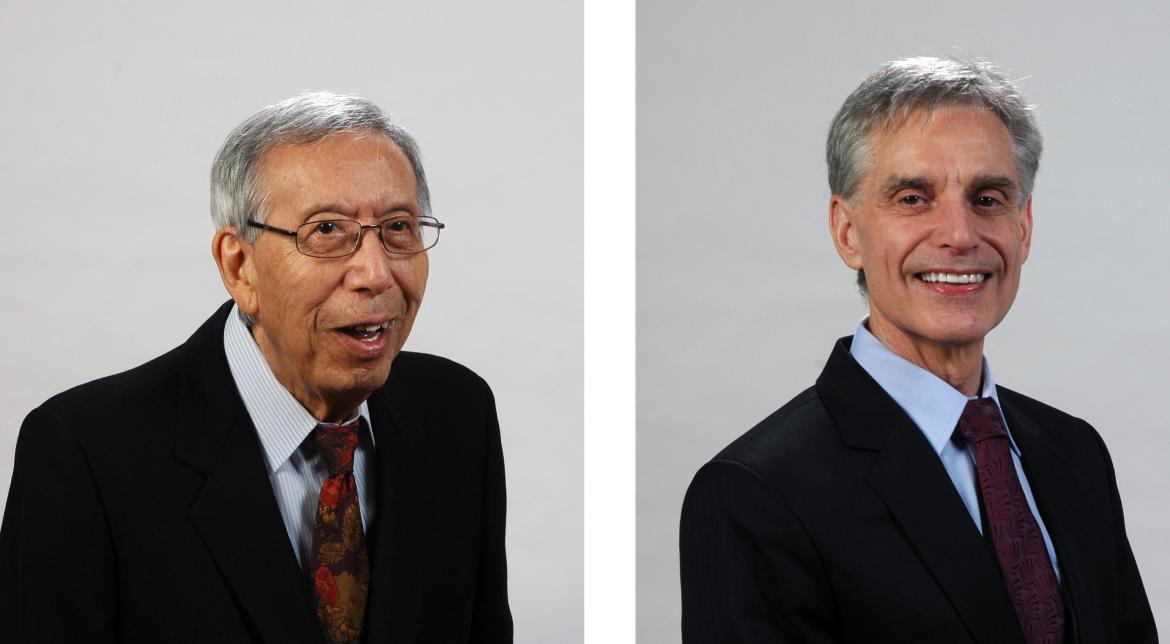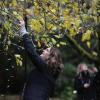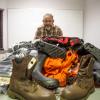
December 19, 2011 - 6:53am
Two lifelong friends and business associates who have helped thousands of people transform their lives through programs offered at an internationally renowned centre for professional and personal development will receive special accolades from Vancouver Island University.
Dr. Jock McKeen and Dr. Bennet Wong, founders of The Haven Institute on Gabriola Island, will receive honorary doctorate degrees at VIU’s convocation ceremony Feb. 9.
Since 1983, The Haven Institute has welcomed thousands of participants on a journey of self-discovery, towards a more fulfilled life.
McKeen and Wong have developed a rich variety of courses by blending traditional Chinese medicine with western psychiatry and humanistic psychology into a unique and in-depth approach to self-development. They believe in an integrated approach in body, mind and spirit, emphasizing responsibility for the self in health, relationships and lifestyle.
“We feel deeply honored to be receiving honorary doctorate degrees from Vancouver Island University,” said McKeen. “To be recognized for our life work over the past 40 years is extremely gratifying.”
VIU President Dr. Ralph Nilson says honorary doctorate degrees issued by VIU “celebrate and encourage a standard of excellence and innovation that is exemplary to students, faculty, staff and communities we serve.
“Jock McKeen and Bennet Wong are very deserving of this special honor,” said Nilson. “Their work as consultants, leaders, educators and authors has been recognized as an outstanding distinction and achievement, and a shining example of excellence and innovation to society in general.”
Often called the University of the Heart, The Haven is a major employer on Gabriola, and has attracted students from all over the world to spend time on the island and in the region. McKeen and Wong created a number of core programs which continue to be taught, including the renowned five-day Come Alive, and the 25-day Living Alive Phase programs.
McKeen and Wong’s initial meeting in 1970 was a ‘meeting of the minds.' "We both had similar objectives in working with people, and collaborated easily," said Wong.
McKeen trained in the traditional western medicine at the University of Western Ontario. As a young doctor, he worked in street clinics and drug crisis centres and served as one of two interns in a rural hospital in Jamaica. He returned with a new vision of intercultural work that has continued to this day.
He discovered the ancient Chinese classic, the Yi Jing (Book of Changes) and went on to study at the College of Chinese Acupuncture in Oxford, England, achieving his Licentiate in Acupuncture. This was at a time when there was little information or practice of acupuncture available in Canada.
Wong, a product of a Chinese-Canadian family, earned his medical degree from the University of Alberta, and completed his post graduate training at the Menninger School of Psychiatry. He served as the clinical director at the Winfield State Hospital in Kansas where his groundbreaking work at that institution, aimed at helping patients develop and advance within their limitations, shaped his core belief – that all human beings have worth and are to be treated with respect and dignity.
Wong moved to Vancouver in 1961 to practice adolescent psychiatry. He consulted with schools and agencies, and became an increasingly well-known and public advocate for adolescents, and expert in the field of dealing with troubled youth.
McKeen, upon his return to BC in 1973, established his acupuncture practice in the same office building as Wong in Vancouver, sharing a common waiting room. Thus began a lifelong partnership in work and teaching. “Our waiting room became a special place,” said McKeen. “We had elderly people coming in for acupuncture treatments and young teenagers coming in for psychological help. The older folk were looking for relief, and the young people were looking for life direction.
“We learned that they were coming early to their appointments to meet with each other in the waiting room. They were healing each other through their interactions. So, we began to dream of a waiting room experience that could be extended, to facilitate people's communication with each other. This led us to developing a rural educational centre where people can live together for extended periods of time, to learn throughout the day in a natural way."
Wong and McKeen closed their practices in 1975 to conduct a three-month seminar at a growth centre on Cortes Island, and never went back. Since then, they have focused on group process work over their years of collaboration. They established The Haven and bought a resort on Gabriola that could accommodate up to 100 people.
“Our goal has been to help people find meaning and purpose in their lives,” said McKeen. “In life, people are taught how to live in a world of objects, how to, do math, achieve a title or certificate, get a job, and rise in successful careers. But our education system lags behind in the education of the heart. By learning to open to their human natures by sharing, people can develop human feeling and connection with each other. This is our East and West philosophy. This is what Confucius was saying centuries ago, about 'acting from one's heart.' This is the essence of the teaching at The Haven Institute."
Wong and McKeen were invited to present at the first World Congress of Acupuncture and Chinese medicine in Beijing in 1987. “On this trip, our hope was to learn more about classical Chinese medicine,” said McKeen. “We presented ancient Chinese ideas that linked the philosophies of Daoism and Confucianism with healing. We discovered that these perspectives were currently in disfavour. In the materialistic climate of the times, spirituality was seen to be superstitious. When we spoke of their ancient traditions, we were struck by the eagerness of our Chinese audience to learn what we were presenting. We went there to learn; we were humbled to be welcomed as teachers of their old ways."
The result was a close connection with the Chinese culture. “Over the years, we’ve traveled to Asia many times to teach, and had hundreds of Chinese people have come to The Haven to attend our workshops,” said McKeen. “We have worked with a sister organization in China, and another in Taiwan, and we continue to offer full programs with translation for Chinese people at The Haven. “
Now that they are retired, the faculty they have trained continue their cross-cultural work with numerous programs in China each year. “The Haven is really an intercultural school,” said McKeen. “We teach about sharing with open hearts. By listening to one another we can appreciate diversity.”
Nanaimo lawyer Gerry Owen, who nominated McKeen and Wong for the honorary doctorate degrees, said their work “became a harmonious blending of eastern and western medical approaches. Through their courses, people have discovered themselves in new ways, often changing their lives indelibly, and thereby having a positive effect on those around them. It is these courses that make the Haven unique, and which continue to attract participants in large numbers to this day.”
“The methods they introduced into the courses are educational, broad and eclectic, derived from a great variety of sources in the fields of humanistic and transpersonal psychology, as well as more traditional fields of psychology, religious studies, drama, music and art,” added Owen.
Over the years,The Haven has attracted a faculty of like-minded students and teachers. Wong and McKeen have travelled the world leading numerous seminars and workshops Although their overseas work has concentrated on Asia, they have also taught in Europe, Africa, Russia, the Middle East, and in South America, Mexico and the U.S. Many who have studied with them outside Canada have found their way to Canada to the Haven school.
Prior to retiring in 2004, Wong and McKeen helped to create a federal charity, the Haven Foundation, and transferred the ownership of their privately owned business into it. The Haven Foundation now owns the Haven Institute.
They continue to work internationally as consultants to Hua Wei Technologies, a global telecommunications company operating in over 100 countries, and they are faculty members of Hua Wei's corporate university.
Together, they have authored eight books, with translations into Chinese and Spanish. They are currently writing a book summarizing their work over the past four decades, which will be completed in 2012.
McKeen and Wong will receive their honorary doctorate degrees at the VIU convocation ceremony Feb. 9 at the Port Theatre in Nanaimo.
Tags: In the Community






